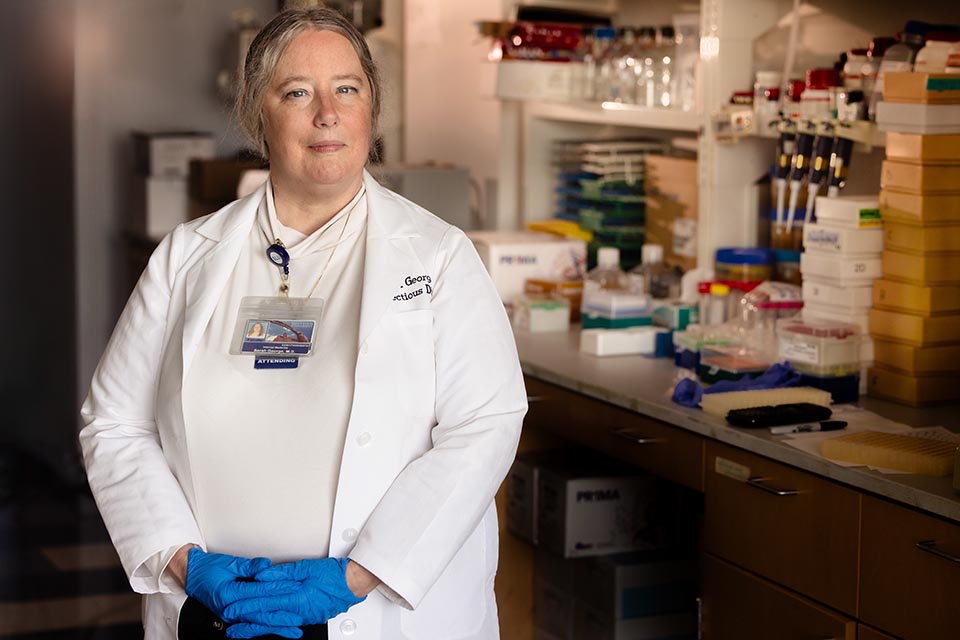Saint Louis University and Taylor Geospatial Institute Announce Major Milestone as TGI Evolves with Move to Independence
ST. LOUIS (May 2, 2025) — After nearly three successful years working under the Saint Louis University umbrella, the Taylor Geospatial Institute (TGI) is now poised to take a major step forward by becoming a standalone nonprofit organization this year. The transition marks the next phase in TGI’s evolution, ensuring its continued growth and long-term impact.
Founded in 2022, TGI is a first-of-its-kind institution that brings together eight leading research institutions to collaborate on research into geospatial technology. Its establishment was a key step in advancing the GeoFutures Strategic Roadmap, the region’s plan to become the world’s geospatial center by 2030.
“TGI’s growth and development is an impressive success story, reflecting SLU’s ability to launch and nurture bold, innovative initiatives that can stand on their own and continue to thrive,” said Saint Louis University President Fred P. Pestello. “TGI’s evolution to an independent organization sets the stage for an even greater impact on the St. Louis economy in the years ahead.”
“This transition builds upon the strong foundation that Saint Louis University has provided since TGI’s inception, and we are deeply grateful for SLU’s leadership and steadfast support,” added Robert Cardillo, chair of the Taylor Geospatial Institute Governing Council. “We extend our appreciation to SLU for its visionary role in establishing, housing and guiding TGI to this point.”
TGI was made possible by a legacy investment from Andrew C. Taylor, executive chairman of Enterprise Mobility and founding chair of Greater St. Louis, Inc., with supporting investments from each of the eight member institutions.
“We are profoundly appreciative of Andy Taylor for selecting SLU to launch the Taylor Geospatial Institute,” Pestello said. “We are grateful for his trust in our researchers, staff and students to be the primary catalysts for geospatial innovation and collaboration here in St. Louis.”
SLU will retain a portion of Taylor’s gift to strategically support SLU faculty, research and initiatives that advance the field of geospatial science and drive workforce and economic development in the region. Gregory Triplett, Ph.D., the Oliver L. Parks Dean of SLU’s School of Science and Engineering, will serve as the University’s primary contact for TGI-related matters.
“Our ongoing collaboration with TGI will ensure that our research faculty, staff and students will always be at the forefront of groundbreaking geospatial research and innovation,” Pestello said. “Together, we’re creating a dynamic environment that not only pushes the boundaries of geospatial science today but also is shaping the future of the field for generations to come.”
In addition to Saint Louis University, the consortium also includes the Donald Danforth Plant Science Center, Harris-Stowe State University, University of Illinois Urbana-Champaign, Missouri University of Science & Technology, University of Missouri-Columbia, University of Missouri-St. Louis, and Washington University in St. Louis.
“This important move is the culmination of months of thoughtful engagement guided by our shared commitment to ensuring TGI’s long-term growth, sustainability and impact,” Cardillo said. “TGI’s purpose remains clear: to fuel St Louis’ regional economic development via a global geospatial center of excellence by advancing interdisciplinary research to tackle pressing scientific and societal challenges.”
As it transitions to an independent organization, TGI remains fully committed to its initiatives. All existing grants, fellowships, startup packages, postdoc support, embedded research scientist roles and block/seed funding will continue as planned, as will the consortium’s multi-year programs, Geospatial Innovations for Food Security and the Center for AI.
Latest Newslink
- A Camp Friendship that Stirred Up Lifelong BondsIn the summer of 2005, Mary Kate Keenoy (Chaifetz Grad '22) and Genevieve Willman met at SLU's Gardens to Tables culinary camp. What started as a shared interest in cooking grew into a lasting friendship that has endured for two decades.
- Bruce Bacon, M.D.: 1949-2025Bruce Bacon, M.D., professor emeritus of internal medicine, died Sunday, July 6, 2025. He was 75. Bacon was known globally for his expertise in all aspects of clinical hepatology, specifically hemochromatosis, viral hepatitis, chronic liver disease / general hepatology, and liver transplant. Bacon was also a member of the research team that discovered the gene for hemochromatosis, HFE, in 1996.
- SLU Launches William L. Clay, Sr. Institute of Civic Engagement and Economic JusticeThe Clay Institute will provide immersive learning experiences and hands-on training that address the social and economic challenges facing the St. Louis region and the nation. Institute programming will be available to all students with an interest in civic engagement and democratic participation.
- SLU Research Explores Depression's Ripple Effect on DiabetesA study conducted by researchers at Saint Louis University found that patients with depression were more likely to have uncontrolled diabetes over time and that depression contributes to a heightened economic burden to diabetes management.
- SLU/YouGov Poll: Statewide Cell Phone Ban for Missouri Schools Popular with VotersGovernor Mike Kehoe has signed Senate Bill 68 into law, enacting a statewide ban on the use of personal electronic devices, including cell phones, tablets, and smartwatches, throughout the school day in Missouri public and public charter schools.
- SLU Vaccine Center Will Enroll Healthy Volunteers in Yellow Fever Vaccine Clinical TrialSaint Louis University's Center for Vaccine Development will enroll up to 70 adult volunteers in a clinical trial to study the safety elicited by a new investigational vaccine for yellow fever, a potentially deadly disease that is spread by mosquitoes. The research is funded by Sanofi Pasteur.













